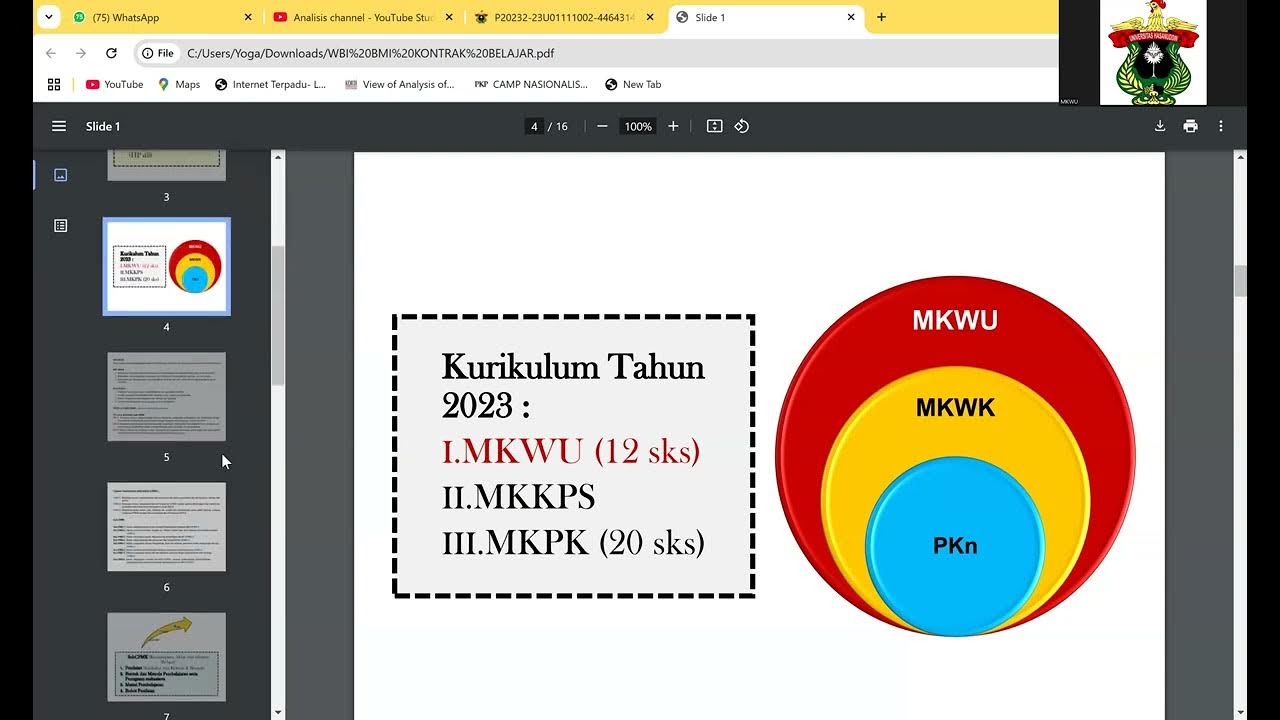ISIP4211 Logika | Pengertian Logika
Summary
TLDRIn this video, Safira introduces a logic course based on Open University's ISIP4211 material. She explains the basics of logic, starting with its definition as the science of valid conclusions, derived from the Greek word *logos*. The course covers both traditional and modern logic, highlighting key differences and their applications. Key concepts like deductive and inductive logic are explored, along with examples to demonstrate how conclusions are formed. The video aims to provide viewers with a solid foundation in logical reasoning, preparing them for more in-depth lessons in future videos.
Takeaways
- 😀 Logic comes from the Greek word 'logos', meaning the science of describing thoughts and the theory of valid conclusions.
- 😀 Logic is divided into traditional and modern logic, with traditional logic focusing on reasoning patterns and modern logic emphasizing sets and broader concepts.
- 😀 Traditional logic involves conclusions that may not necessarily be true, even when the premise is correct. It highlights the need for reasoning patterns to be coherent.
- 😀 An example in traditional logic demonstrates that if the premises are disconnected, the conclusion may be incorrect, even if it is logically valid.
- 😀 Modern logic uses sets to define relationships between terms and statements, focusing on the logical structure of the reasoning.
- 😀 An example in modern logic shows how sets can be used to prove that all humans, as part of organisms, experience change.
- 😀 Deductive logic ensures conclusions are certain and are based on the truth of premises. It is formal logic concerned with valid reasoning structures.
- 😀 In deductive logic, conclusions are derived from premises in such a way that, if the premises are true, the conclusion must be true.
- 😀 Inductive logic, also known as material logic, deals with conclusions that are probable but not certain. It is based on patterns observed in reality.
- 😀 The difference between deductive and inductive logic lies in certainty: deductive reasoning guarantees the truth of conclusions, while inductive reasoning only suggests possibilities.
Q & A
What is the definition of logic according to the video?
-Logic is the science of describing thoughts, derived from the Greek word 'logos,' which means the theory of valid conclusions. It serves as a bridge between philosophy and science by examining reasoning systems that lead to valid conclusions.
What is the difference between traditional logic and modern logic?
-Traditional logic focuses on reasoning patterns and conclusions that may not necessarily be true even if the premises are correct, while modern logic emphasizes the use of sets and broader concepts, ensuring conclusions follow from true premises.
What are the two main types of logic discussed in the video?
-The two main types of logic discussed are deductive logic and inductive logic. Deductive logic leads to certain conclusions based on the premises, while inductive logic leads to probable conclusions, as long as there is no evidence to refute them.
How does deductive logic differ from inductive logic?
-Deductive logic produces certain conclusions based on the premises, whereas inductive logic produces conclusions that are possible but not guaranteed, depending on the evidence available.
What is an example of traditional logic in the script?
-In traditional logic, the example given is about the premise that 'angels are physical objects' and 'the stone is an angel,' leading to the incorrect conclusion that 'the stone is a physical object,' even though the premises are not logically connected.
What is the purpose of logic as described in the video?
-The purpose of logic is to examine reasoning systems and principles that lead to valid conclusions, ensuring that thought processes are structured and conclusions can be traced back and verified.
What is the significance of sets in modern logic?
-In modern logic, sets represent collections with certain characteristics. For example, the term 'human' refers to a set of rational beings, and conclusions are drawn based on the relationships between these sets.
What role do valid conclusions play in logic?
-Valid conclusions are those that logically follow from the premises based on established reasoning principles. In both traditional and modern logic, conclusions must be coherent, traceable, and correct.
What is the role of symbols in modern logic?
-Symbols in modern logic are used to simplify reasoning and conclusions. For instance, the symbol 'B' is used to represent organisms, and 'C' represents the set of things that experience change, making logical relationships easier to express and understand.
What is the difference between deductive logic and symbolic logic?
-Deductive logic is a broader reasoning system that leads to certain conclusions, while symbolic logic specifically uses symbols and set relationships to formalize reasoning and ensure the correctness of conclusions.
Outlines

Этот раздел доступен только подписчикам платных тарифов. Пожалуйста, перейдите на платный тариф для доступа.
Перейти на платный тарифMindmap

Этот раздел доступен только подписчикам платных тарифов. Пожалуйста, перейдите на платный тариф для доступа.
Перейти на платный тарифKeywords

Этот раздел доступен только подписчикам платных тарифов. Пожалуйста, перейдите на платный тариф для доступа.
Перейти на платный тарифHighlights

Этот раздел доступен только подписчикам платных тарифов. Пожалуйста, перейдите на платный тариф для доступа.
Перейти на платный тарифTranscripts

Этот раздел доступен только подписчикам платных тарифов. Пожалуйста, перейдите на платный тариф для доступа.
Перейти на платный тарифПосмотреть больше похожих видео

Tutorial Laravel 8 #2 - MVC, Penjelasan Stuktur Folder Project dan Memahami Route

Lecture 1 - Propositional Logic

FILM PENDEK "BERSYUKUR ATAS NIKMAT ALLAH"

WBI BMI Video Kontrak Belajar

What is Physical Science? What will this course cover - MoT Physical Science - Science Skills

Operadores Lógicos e Relacionais - Curso de Algoritmos #04 - Gustavo Guanabara
5.0 / 5 (0 votes)
